|
|
|
Sort Order |
|
|
|
Items / Page
|
|
|
|
|
|
|
| Srl | Item |
| 1 |
ID:
142060
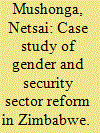

|
|
|
|
|
| Summary/Abstract |
This article explores gender and security sector reform (SSR) in Zimbabwe from 2008 to the present. It firstly postulates that the purpose of gender-sensitive SSR is to transform security services so as to enhance human security, as opposed to having an exclusive focus on state and territorial security. A comprehensive analysis of the policy and legislative framework governing gender and SSR at the global, continental, sub-regional and national levels will be presented, followed by the argument that efforts to reform the partisan and oftentimes non-professional tendencies of the security sector – especially the Zimbabwe Defence Forces, Zimbabwe Republic Police, Central Intelligence Organisation and Zimbabwe Prison Services – to promote democracy have met with firm resistance. However, gender-sensitive SSR has made significant headway in Zimbabwe since it is considered less threatening by the government. It should be noted, nevertheless, that gender-sensitive SSR has the potential to shift levels of professionalism and accountability within the sector as well as change attitudes to enhance security at the personal and communal levels. The process can gradually increase the percentage of women serving in the security sector. In conclusion, recommendations are made to broaden and deepen gender-sensitive SSR as the only viable alternative in the current political environment in Zimbabwe.
|
|
|
|
|
|
|
|
|
|
|
|
|
|
|
|
| 2 |
ID:
142053
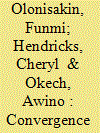

|
|
|
|
|
| Summary/Abstract |
This article explores the convergence between three pillars of influence – feminist security studies, civil society activism and policy decision-making – and its role in the adoption and implementation of United Nations Security Council Resolution (UNSCR) 1325. It argues that these three pillars, individually and collectively, have made important contributions to the debate and action on the gender and security agenda, but that they remain organically disconnected. Their convergence has the potential to achieve path-breaking results in the sphere of gender and security, whilst their divergence makes transformation unattainable. We show the disconnect in the application of UNSCR 1325 in Africa and argue that this is partly the reason why, despite enormous efforts, the gains realised in terms of gender equality in the peace and security arena have been negligible.
|
|
|
|
|
|
|
|
|
|
|
|
|
|
|
|
| 3 |
ID:
142055
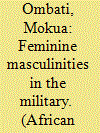

|
|
|
|
|
| Summary/Abstract |
Historically, the military presents more defined gender boundaries than any other state institution. Assignment to traditionally non-feminine roles means crossing gender-assigned and constructed boundaries. This article explores the interplay of the contradictory dynamics of gender in the military through the lens of Kenyan women combatants in the war against al-Shabaab insurgents in Somalia. Military combat roles have traditionally relied on and manipulated ideas about masculinity and femininity. The study uses the twin theoretical frameworks of sociocultural capital and cultural scripts, refined by a gender-framing perspective, to interpret the sociocultural attitudes of masculinity and femininity in terms of war, the military and militarism.
|
|
|
|
|
|
|
|
|
|
|
|
|
|
|
|
| 4 |
ID:
142056
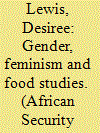

|
|
|
|
|
| Summary/Abstract |
Policy research and scholarship on food has rapidly increased in recent decades. The attention to ‘gender' within this work appears to signal important practical and academic efforts to mainstream gendered understandings of food consumption, distribution and production into expansive conceptualisations of human security. This article argues that the gender-related work on food has wide-ranging and often troubling political and theoretical foundations and implications. Often growing out of knowledge regimes for managing social crises and advancing neo-liberal solutions, much gender and food security work provides limited interventions into mainstream gender-blind work on the nexus of power struggles, food resources and globalisation. A careful analysis of knowledge production about gender and food is therefore crucial to understanding how and why feminist food studies often transcends and challenges dominant forms of scholarship and research on food security. This article's critical assessment of what food security studies in South Africa has entailed at the regional level and in global terms also focuses on the methodological and theoretical feminist interventions that can stimulate rigorous conceptual, research and practical attention to what has come to be understood as food sovereignty.
|
|
|
|
|
|
|
|
|
|
|
|
|
|
|
|
| 5 |
ID:
142061
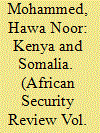

|
|
|
|
|
| Summary/Abstract |
Much research has been done on patriarchy in numerous contexts in Africa, contributing to an understanding of the phenomenon. Recent developments in Kenya and Somalia, characterised by the adoption of new constitutions against the backdrop of stringent patriarchal practices, prompted the writing of this article. Kenya's journey towards gender equality has not been an easy one, given that prior to 2010 – when its new constitution was adopted – customary law that endorsed the violation of women's rights held precedence. For Somalia, over two decades of civil war had encouraged lawlessness, which acted as a barrier for women's progress. With the two countries' new constitutions now in place, expectations are high that past hindrances will be eradicated. Kenya and Somalia stand a good chance of achieving gender equality if lessons from other countries can be carefully considered to avoid a repeat of their failures. Using secondary and primary data, it is this article's argument that an honest dialogue on women's rights involving all relevant stakeholders needs to be initiated to tackle the deeper structural problem of patriarchy, which poses a huge threat to the gains achieved on paper.
|
|
|
|
|
|
|
|
|
|
|
|
|
|
|
|
| 6 |
ID:
142058
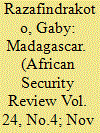

|
|
|
|
|
| Summary/Abstract |
Despite a constitution that condemns discrimination, as well as positive efforts by all stakeholders, Madagascar is still far from meeting the desired objectives of the Southern African Development Community (SADC) Protocol on Gender and Development, or any other relevant international instruments and conventions. The establishment of an Organising Technical Committee on security sector reform for Madagascar is a positive development, which will hopefully facilitate an understanding of the multiple facets of gender and security in Madagascar as well as advancing the implementation of the instruments calling for greater female participation in the security sector.
|
|
|
|
|
|
|
|
|
|
|
|
|
|
|
|
| 7 |
ID:
142059


|
|
|
|
|
| Summary/Abstract |
Commitment by the government of the Democratic Republic of Congo to addressing sexual and gender-based violence (SGBV) in the country is reflected in a number of international commitments and national strategies. This article traces the (slow) progress in addressing some of the most important issues relating to SGBV to which the government has committed itself. It argues that unless the underlying gender norms and unequal power relations that form the basis of gender violence, discrimination and inequality in Congolese society are addressed, SGBV will persist.
|
|
|
|
|
|
|
|
|
|
|
|
|
|
|
|
| 8 |
ID:
142054
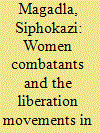

|
|
|
|
|
| Summary/Abstract |
This article examines women's role as combatants in national liberation forces in South Africa. Three categories – guerrilla girls, combative mothers and the in-betweeners – are introduced to underscore the varied ways in which women have participated in combat within the national liberation movements. Factors such as age and one's ability to leave the country affected whether women could participate in combat as ‘guerrilla girls’ or if it limited them to fighting apartheid violence from home, or if there were women who can be defined as having fallen somewhere in between these categories. These categories are used to theorise women's combat roles in the anti-apartheid struggle, thus broadening and challenging the dominant notions of combat that often hide women's contributions in war. In this regard, different periods of struggle, physical location, as well as age, determined the methods of activism available to men and women.
|
|
|
|
|
|
|
|
|
|
|
|
|
|
|
|
| 9 |
ID:
142057


|
|
|
|
|
| Summary/Abstract |
This article details the history and philosophy behind major changes in police tradition and organisation in Nigeria in 1955. Women in the Nigeria Police Force (NPF), influenced by their background as enforcers of societal norms, developed a type of social-work-oriented policing. Using primary and secondary sources of historical information, this article discusses the origin of women in the NPF, the specialised role of women in police work, and the changes that have been effected in the roles and functions of women in policing in Nigeria. Situated within the conceptual frameworks of patriarchy and gender, this article argues that gender biases impeded the incorporation of women into the police and, when eventually introduced, gender limitations constrained their roles, operations and activities.
|
|
|
|
|
|
|
|
|
|
|
|
|
|
|
|
| 10 |
ID:
142052
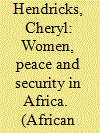

|
|
|
|
|
| Summary/Abstract |
This article highlights and critiques the underlying conceptualisations and assumptions of the women, peace and security (WPS) agenda that emerged with the adoption of United Nations Security Council Resolution 1325 in 2000. The main argument is that we need to rethink the WPS agenda to produce more holistic and groundbreaking responses for the types of challenges encountered, i.e., that gender inequality and insecurity are deep rooted and multi-layered, and thus negate mechanistic responses that do not deal with cultural and structural issues. It specifically focuses on gender and peace-making and gender and peacekeeping to point to the pitfalls in the current conceptions and practices in this arena.
|
|
|
|
|
|
|
|
|
|
|
|
|
|
|
|
|
|
|
|
|